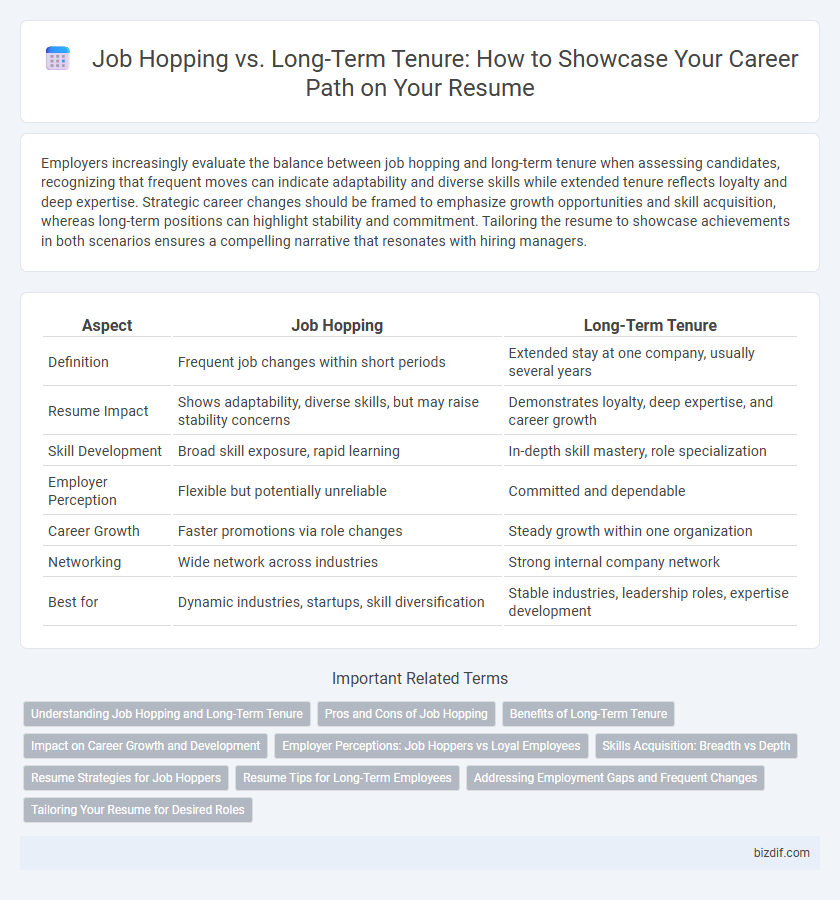Employers increasingly evaluate the balance between job hopping and long-term tenure when assessing candidates, recognizing that frequent moves can indicate adaptability and diverse skills while extended tenure reflects loyalty and deep expertise. Strategic career changes should be framed to emphasize growth opportunities and skill acquisition, whereas long-term positions can highlight stability and commitment. Tailoring the resume to showcase achievements in both scenarios ensures a compelling narrative that resonates with hiring managers.
Table of Comparison
| Aspect | Job Hopping | Long-Term Tenure |
|---|---|---|
| Definition | Frequent job changes within short periods | Extended stay at one company, usually several years |
| Resume Impact | Shows adaptability, diverse skills, but may raise stability concerns | Demonstrates loyalty, deep expertise, and career growth |
| Skill Development | Broad skill exposure, rapid learning | In-depth skill mastery, role specialization |
| Employer Perception | Flexible but potentially unreliable | Committed and dependable |
| Career Growth | Faster promotions via role changes | Steady growth within one organization |
| Networking | Wide network across industries | Strong internal company network |
| Best for | Dynamic industries, startups, skill diversification | Stable industries, leadership roles, expertise development |
Understanding Job Hopping and Long-Term Tenure
Job hopping involves changing jobs frequently, typically within one to two years, allowing professionals to rapidly gain diverse skills and adapt to new environments. Long-term tenure refers to staying with a single employer for several years, demonstrating loyalty, stability, and in-depth knowledge of company culture and processes. Understanding these concepts helps tailor resumes to highlight either adaptability and varied experience or commitment and expertise, depending on career goals and industry expectations.
Pros and Cons of Job Hopping
Job hopping offers opportunities to quickly expand skill sets and build diverse industry experience, increasing adaptability and marketability to employers. However, frequent job changes may signal a lack of commitment or stability, potentially raising red flags for recruiters assessing candidate reliability. Balancing strategic moves with demonstrated accomplishments in each role helps mitigate concerns associated with job hopping on a professional resume.
Benefits of Long-Term Tenure
Employers value long-term tenure for its demonstration of loyalty, deep industry expertise, and sustained contributions to company growth. Staying with one organization allows professionals to build robust networks, develop leadership skills, and gain comprehensive knowledge of company operations. This stability often translates into increased job security, higher potential for promotions, and a stronger professional reputation.
Impact on Career Growth and Development
Frequent job hopping can provide diverse skill sets and broaden industry exposure, accelerating career growth through varied experiences and rapid learning opportunities. Long-term tenure fosters deep expertise, stronger professional relationships, and leadership development, which contribute to sustained career advancement and organizational influence. Balancing strategic job changes with periods of commitment ensures optimized career growth and skill development.
Employer Perceptions: Job Hoppers vs Loyal Employees
Employers often perceive job hoppers as adaptable professionals who seek diverse experiences but may question their long-term commitment and reliability. Loyal employees with long-term tenure are valued for their in-depth organizational knowledge, consistency, and demonstrated dedication. Balancing these perceptions, candidates should emphasize how their career trajectory aligns with the prospective employer's values and goals.
Skills Acquisition: Breadth vs Depth
Job hopping accelerates skills acquisition by exposing professionals to diverse industries, roles, and technologies, fostering a broad skill set adaptable to various challenges. In contrast, long-term tenure emphasizes depth of expertise, enabling mastery of specialized skills and deep understanding of organizational processes. Balancing breadth and depth through strategic career moves enhances both versatility and specialization, increasing overall employability and value in dynamic job markets.
Resume Strategies for Job Hoppers
Job hoppers can optimize their resumes by emphasizing skills growth, diverse industry experience, and adaptability to new environments. Highlighting project achievements and quantifiable results in each role counters perceptions of instability. Strategically grouping short-term positions under a common theme or consulting category further strengthens the narrative for potential employers.
Resume Tips for Long-Term Employees
Highlighting long-term tenure on a resume demonstrates stability, commitment, and deep expertise within a specific industry or company, which appeals to employers seeking reliability and institutional knowledge. Emphasize achievements, promotions, and skills developed over the years to showcase growth and value addition rather than just duration. Use quantifiable results and specific projects to underscore consistent performance and adaptability during extended employment periods.
Addressing Employment Gaps and Frequent Changes
Addressing employment gaps and frequent job changes in a resume requires strategic framing to highlight skills acquired and contributions made during each period. Emphasizing accomplishments and continuous learning can mitigate concerns about job hopping, while explaining gaps with relevant experiences, such as freelancing, education, or volunteer work, demonstrates proactivity. Tailoring the resume to show stability through consistent skill development reassures employers seeking reliable candidates.
Tailoring Your Resume for Desired Roles
Tailoring your resume for desired roles requires emphasizing relevant experiences regardless of job hopping or long-term tenure, showcasing skills and achievements aligned with job descriptions. Highlighting transferable skills and quantifiable results helps bridge gaps caused by frequent moves or underline stability from extended employment. Customizing keywords and prioritizing accomplishments linked to the target role enhances ATS compatibility and attracts recruiter attention.
Job Hopping vs Long-Term Tenure Infographic

 bizdif.com
bizdif.com